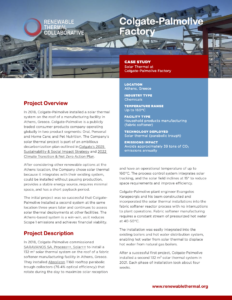 To advance their decarbonization goals, RTC Member Colgate-Palmolive installed a solar thermal system, built by RTC Solutions Provider Absolicon, on the roof of a home goods manufacturing facility in Athens, Greece. After considering other renewable options, Colgate chose solar thermal because it integrates with their existing system, could be installed without pausing production, provides a stable energy source, requires minimal space, and has a short payback period.
To advance their decarbonization goals, RTC Member Colgate-Palmolive installed a solar thermal system, built by RTC Solutions Provider Absolicon, on the roof of a home goods manufacturing facility in Athens, Greece. After considering other renewable options, Colgate chose solar thermal because it integrates with their existing system, could be installed without pausing production, provides a stable energy source, requires minimal space, and has a short payback period.
The project shows how renewable thermal installations can be a win for both decarbonization and financial objectives. The system’s installation avoids 39 tons of Scope 1 emissions each year, contributing to Colgate’s 2025 Sustainability & Social Impact Strategy and 2022 Climate Transition & Net Zero Action Plan. The project also resulted in net cost savings, with a short project payback period and a double-digit rate of return.
The RTC’s case study on the project highlights:
- The project and its outcomes
- Industrial solar thermal technology
- Integration with other technologies such as heat recovery
- Colgate-Palmolive’s decarbonization commitment
- Lessons learned
- Next steps for interested buyers
Fill out the form to download the case study:
Related Materials:
- Webinar Recording: Case Studies in Industrial Process Heat Decarbonization
- RTC Partner Locator
- Our Work: Solar Thermal
- More Case Studies

